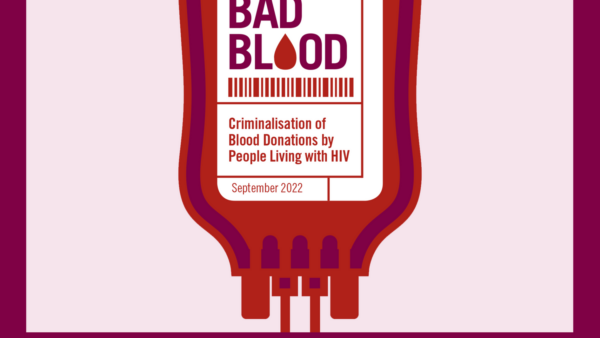Overview
In October 2022 the Central African Republic adopted a new HIV-specific omnibus law outlining the state response to HIV/AIDS, the rights and protections of people living with HIV, and criminalisation of certain conduct. When the final law was published in November 2022, it replaced the Law on the Rights and Obligations of PLWHA (Act No. 06.030 of 12 September 2006), which previously governed the rights and criminalisation of people living with HIV.
Article 72 of the 2022 law makes ‘voluntary transmission of HIV’ an offence. This firstly criminalises intentional transmission of HIV through unprotected sex without disclosing status. Article 72 also makes it an offence to knowingly share objects or substances ‘contaminated with HIV’. It also criminalises people who perform blood transfusions or tissues or organ transplantation with knowledge that HIV is present in the donated blood, tissues, or organs. This part of the offence appears to criminalise medical professionals, rather than HIV-positive donors, which is a change from the 2006 law as that explicitly criminalised donors (see our report, Bad Blood, for a global analysis of the criminalisation of blood donations).
Importantly, the law now outlines explicit defences to criminalisation under Article 76, which states that no prosecution shall occur: for mother-to-child transmission either before birth, during delivery, or through breastfeeding, where the person living with HIV was not aware of their status, if they disclosed their status to their partner, if they practiced safe sex, or for any acts which carry no significant risk of transmission.
The maximum penalty ascribed for this offence is unchanged, as Article 73 states those convicted are liable to the penalty under Article 249 of the Penal Code, which criminalises ‘knowing contamination’, which stands at hard labour for life.
Title VI of the 2022 law also establishes prohibitions on discrimination against people living, or suspected of living, with HIV, including in access to healthcare, employment, education, travel, public office, financial loans, insurance, and in detention. Violation of these protections can result in prosecution and a penalty of three months to two years’ imprisonment and/or a fine (or doubled in the case of healthcare discrimination) under Article 71.
The 2022 law is a significant improvement on the 2006 law, which contained a number of restrictive requirements on people living with HIV, such as the requirement to always wear condoms during sex, an obligation to disclose status, a prohibition of blood donations, and a general ban on any conduct that could theoretically lead to HIV transmission, even if transmission did not occur. The requirement in the 2022 law for intent and transmission for unprotected sex without disclosure to constitute an offence is a significant narrowing of the scope of criminalisation compared with the 2006 law. The articulation of explicit defences to criminalisation are also hugely welcome, as these prohibit criminalisation of people who wear condoms or disclose their status, and could prevent prosecution of those with a suppressed viral load.
However, the ambiguous drafting of the prohibitions against sharing objects or substances, and administering transfusions or transplantations, leaves open the possibility of criminalisation where transmission does not take place. Additionally, notwithstanding the 2022 reform, Article 249 of the Penal Code continues to criminalise ‘attempts’ to transmit, meaning that HIV ‘exposure’ may still be prosecuted.
Although several court referrals have been received under the various versions of the law, they have ended in amicable settlements rather than prosecutions.
Laws
Law on HIV and AIDS in the Central African Republic (Law No. 22/016 of 18 November 2022)
Article 72
Is guilty of the act of voluntary transmission of HIV:
– any person who, knowing that he or she is infected, has had unprotected sex without disclosing his or her serostatus to his or her partner and has intentionally transmitted HIV to another person;
– one who, knowing that the objects she uses are contaminated with HIV, has used them on individuals;
– the one who has voluntarily given HIV infected substances to another person;
– one who, knowing that the blood donated for transfusion or the tissue or organ donated for transplantation is infected with HIV, has performed a blood transfusion OR tissue or organ transplantation on a person.
Article 73
The perpetrators and accomplices of acts of voluntary transmission of HIV shall be punished by the penalties provided for in Article 249 of the Penal Code.
Article 76
No person shall be prosecuted or tried under this Act for transmission of HIV, or for exposure to HIV, where such transmission or exposure occurs in any of the following cases:
– Transmission from mother to child before birth, during delivery and during breastfeeding;
– The person living with HIV did not know their HIV status at the time of the incident;
– An act that carries no significant risk of HIV transmission;
– The person living with HIV has practiced safe sex;
– The person living with HIV has informed his or her sexual partner of his or her HIV status and has obtained the partner’s consent prior to the act.
Law on the Rights and Obligations of PLWHA (Act No. 06.030 of 12 September 2006)
Article 27: Everyone living with HIV/AIDS should only have protected sexual relations.
Article 28: Any practice or behaviour that may lead to the transmission of infection to another person is prohibited to people living with HIV/AIDS.
Article 29: Any person tested for HIV has an obligation to inform his or her spouse. The latter, on the basis of free and informed consent, will be tested for HIV. This obligation also applies in the event of a known cohabitation
Article 31: Any person living with HIV/AIDS is required to submit to the care prescribed by the Physician.
Article 34: Anyone who knows he is HIV-positive and has unprotected sex shall be punished by imprisonment for 2 to 5 years and a fine of 100,000 to 1,000,000,000 francs.
Article 35: Anyone who, knowing that he is a carrier of HIV, knowingly transmits the infection sexually to his partner shall be punished by hard labour for life
Article 37: Anyone who, through negligence, carelessness, carelessness, clumsiness or non-compliance with the regulations, exposes another person to the risk of HIV infection by his act or activity shall be punished by imprisonment for one to two years and a fine of 100,000 to 1,000,000,000 francs.
Article 38: Anyone who, by his act or activity, knowingly causes the transmission of HIV infection to others shall be punished by hard labour for life
Article 39: Any person living with HIV/AIDS who does not declare his or her status to his or her spouse or other partner in the case of a notorious cohabitation shall be punished by imprisonment from 3 months to 1 year or a fine from 100,000 to 1,000,000 francs.
Article 40: Any person living with HIV/AIDS who donates blood, semen or organs shall be punished by imprisonment of 6 months to 2 years and/or a fine of 50,000 to 500,000 francs.
Article 42: Parole may be granted by the President of the territorially competent court at the request of the Public Prosecutor’s Office to a person living with HIV/AIDS whose condition is incompatible with continued detention.
Criminal Code
Article 249
Anyone who, knowing that he is HIV-positive, has knowingly contaminated or attempted to contaminate others in any way whatsoever shall be punished by hard labour for life.
The penalty is one to five years for the perpetrator of the contamination or attempted contamination with a serious or incurable sexually transmitted disease or condition.
Acknowledgements
Report presenting the results of a survey on HIV criminalization in African countries where French is spoken, conducted from May to September 2017.
Authors: Stéphanie Claivaz-Loranger & Cécile Kazatchkine for the Canadian HIV Legal Network and HIV JUSTICE WORLDWIDE
HIV Justice Network's Positive Destinations
Visit the Central African Republic page on Positive Destinations for information on regulations that restrict entry, stay, and residency based on HIV-positive status, as well as access to HIV treatment for non-nationals.


